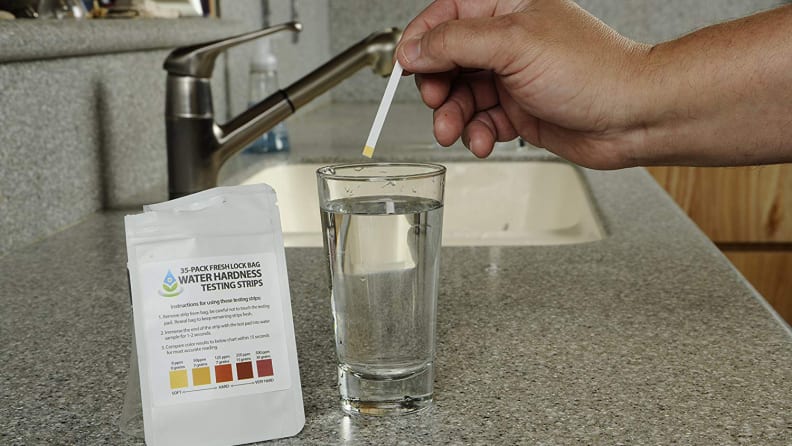Hard Water Testing - An Overview
Hard Water Testing - An Overview
Blog Article
Hard Water Testing Can Be Fun For Everyone
Table of ContentsThe Facts About Hard Water Testing RevealedHard Water Testing Fundamentals ExplainedHard Water Testing - The FactsThe Hard Water Testing PDFsThe 6-Second Trick For Hard Water TestingHard Water Testing for Dummies
Once the water from your shower dries out, mineral deposits are left behind, creating your once-shiny, clear shower doors and fixtures to be covered in water spots. In addition, because water will take longer to heat up, it will utilize much more power and thus increase your utility expenses.The 6-Second Trick For Hard Water Testing
Have you ever before questioned just how to evaluate water hardness in your home? The response may be closer than you think. Difficult water is the result of raised mineral levels in the groundwater supply. While difficult water might be safe and clean water and not necessarily dangerous to your wellness, it does result in a variety of undesirable impacts with which you are probably familiar.
While there are thorough examinations that can offer you an accurate and specific procedure of how hard your water is, determining whether you have hard water is a much less complex workout. In this short article, we're mosting likely to detail some very easy to recognize ideas that can assist you determine whether or not you have hard water.
A few of these are merely undesirable, while others can impact everything from the performance of your home appliances to the moisture of your hair and skin - Hard Water Testing. In the end, you might be amazed at the several means that hard water has had an effect on your everyday life and may be interested in a entire home water softener
The Greatest Guide To Hard Water Testing
Tough water is water that has a high amount of minerals in it. The bulk of these minerals are typically calcium carbonate and magnesium, nonetheless various other minerals such as manganese and iron can additionally be discovered in hard water examples. The greater the mineral count in your water, the more challenging your water is considered.
A higher focus than this is thought about to be tough water, with differing levels of hardness appointed to various thresholds of calcium carbonate. The formation of hard water happens naturally through a communication between water and the soil it passes through. Beginning as rainfall, water is mostly soft, though there may be tiny quantities of minerals contained in rainfall.

The activity of water via the dirt and into the rivers and aquifers that give our water system is long and difficult. As water passes via dirt along the way, it dissolves the bonds of the mineral ions in the dirt. These minerals are after that brought together with the water right into the water that reaches your tap.
The smart Trick of Hard Water Testing That Nobody is Discussing
This usually suggests chalk or limestone. Tough water can additionally have high levels of iron if it moves through iron-rich dirt. Rephrase, the presence or absence of minerals in the soil around a groundwater source has a straight effect on just how tough go to my blog the water is. This implies that the firmness of water can vary considerably based on where you live.
This is additionally why you could observe that the water feels different when you go to another state or country. If you are questioning just how to gauge water firmness, there are a range of different tests you can do to figure out whether your water is hard. Most local water providers likewise release info concerning what sorts of minerals and other substances the water piped into your residence contains.
An example of a regional metropolitan water high quality report can be found below (Hard Water Testing). Short of browsing a water top quality record or examining the water directly at your faucet using a water examination package, there are some very easy empirical techniques that you can make use of to like this figure out if your water is hard
Hard Water Testing Fundamentals Explained
If you have discovered scaly build-up on your components then you more than likely have tough water. You may have noticed that the nozzles on your shower head come to be obstructed with time. This occlusion is due to natural resources left by tough water. The exact same holds true of the nozzles in your dishwashing machine, which slowly end up being blocked by natural resource with time.
White or grey spots have a tendency to be from calcium carbonate, while areas with a high quantity of iron in the water will certainly produce red discolorations on components and taps. If you are continuously fighting soap residue, you have hard water. Soap residue is a white, cloudy layer typically located in showers, in sinks, or on shower room fixtures.

A Biased View of Hard Water Testing
Among these is the effect of hard water on hair. You can examine for water firmness by observing your hair hair cleaned with tough water will start to develop a layer this website of minerals on the hair follicle. This mineral layer has a couple of effects that you may not have also recognized were happening.
Typically, hair washed in difficult water will, with time, end up being duller and do not have the vibrancy of hair washed in soft water. Your hair may additionally be drier when cleaned with tough water vs. soft water. The minerals transferred by tough water makes it harder for creams to permeate your hair follicle, causing drier hair with time.
If you wash your hands with hard water and soap, you will probably notice that your hands can feel a bit dry and rough besides the soap has actually been visibly gotten rid of, calling for lotion or oil. That dry sensation is from a slim layer of soap sticking to the tough mineral left behind and sticking to your hand and is an usual sign that your water is hard.
Report this page